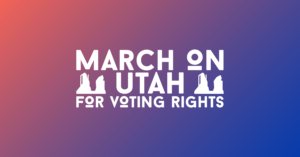
By Emily Olsen, Chair, Utah State Democratic Progressive Caucus
Speech given at March on Utah for Voting Rights rally on August 28, 2021, at the Utah State Capitol
Before I begin, I wanted to take a moment to reflect on the attack in Afghanistan this week. Our hearts are with the members of the military and their families, especially Taylor Hoover from Daggett County, Utah, who have sacrificed so much, even their lives, to protect our democratic republic, including our voting rights. We say a heartfelt thank you.
The 14th Amendment has been in the news a lot this year, particularly in reference to its third section that anyone who has “engaged in insurrection” against the United States can no longer hold civil, military or elected office. Whether those who participated in, helped plan for, or incited the storming of the U.S. Capitol on Jan. 6 “engaged in insurrection” is still subject to interpretation as the investigations continue.
Our attendance here today is peaceful, even full of love for our fellow citizens, that we may all have access to the same voting rights without being subjected to voter suppression in any form. May the disenfranchised reunite with the full body and participate in our most sacred civil right, an action that the Reverend Senator Warnock from Georgia has referred to as a prayer. Voting is the most powerful thing we can do as citizens to influence policies and laws.
Ratified in 1868 after the Civil War, the 14th Amendment gave full citizenship to all persons born or naturalized in the United States, including former slaves, who previously had been viewed only as three-fifths of a person for the census.
Quoting from the 14th Amendment, “No state shall make or enforce any law which shall abridge the privileges or immunities of citizens of the United States; nor shall any State deprive any person of life, liberty, or property, without due process of law; nor deny to any person within its jurisdiction the equal protection of the laws.”
Those are powerful words that practically cry from the dust in response to the voter suppression laws passed this year, or to the Jim Crow laws of the early 1900s, or to our country prior to the fair housing laws that often limited where African Americans and other minorities could live. With clever diction, these laws appear to be written in good faith, but in a year where voter turnout was the highest on record and no significant voter fraud of any kind was found, despite multiple audits to find it, it is easy to see from a broader angle that these laws were designed to suppress democratic voters, in particular. Many registered democrats are minorities or are working-class people with limited time and resources. These citizens are the most impacted by laws that enact tighter deadlines and timeframes related to polling booths and ballots.
Voting laws with too broad of a brush do more harm than good. These laws should be found unconstitutional under the 14th Amendment, but even if they are not, we will find ways around them to protect our most sacred civic right.